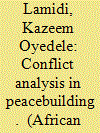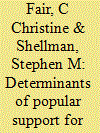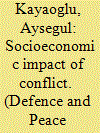|
|
|
Sort Order |
|
|
|
Items / Page
|
|
|
|
|
|
|
| Srl | Item |
| 1 |
ID:
189282


|
|
|
|
|
| Summary/Abstract |
Studies have examined the dimensions and components of conflict analysis. However, little or no review attention has been paid to understanding the conceptual perspectives, theoretical underpinnings and methodological issues. Hence, this paper aimed at filling the gaps and answered the basic questions: Is conflict analysis a potential tool for peacebuilding? In what ways does conflict analysis influence the practice of peacebuilding? How can conflict analysis cover the limitations of peacebuilding? Using secondary data sources, this paper underscored the perspectives and theoretical discourse which underpin the context and structural dynamics of conflict analysis. It also discussed methodological issues by exposing its different levels of practical benefit. Evident examples of conflict analysis were reviewed with notable instances in Africa. This paper, therefore, found out that conflict analysis has great potential for facilitating positive value and social coherence for peacebuilding practices. On the one hand, the outcome of conflict analysis has a direct response to the implementation of peacebuilding strategies. On the other hand, conflict analysis exposes complementary problems resulting in the limitations of peacebuilding. Also, this paper contributed to knowledge by remedying the limitations of peacebuilding. It concluded that a broad participation network would guarantee insightful conflict analysis towards the enhancement of peacebuilding.
|
|
|
|
|
|
|
|
|
|
|
|
|
|
|
|
| 2 |
ID:
084943


|
|
|
|
|
| Publication |
2008.
|
| Summary/Abstract |
Iran's nuclear programme has brought ever-sharpening conflict with Israel, the United States, and the European Union. The Iranian public has been actively drawn into this debate, as the Iranian government cultivates support for its actions and by foreign appeals for change (including Bush administration support for regime change). This article explores data relating to public support for Iran's nuclear program. We utilize data from a nationally representative, face-to-face poll fielded in Iran in late 2006. The poll (n = 1,000) queried respondents about numerous domestic and external security concerns, including Iran's 'full nuclear fuel cycle' program. We present data on Iranian beliefs about Iran's nuclear program and the determinants of those beliefs. After discussing poll methodology and data integrity, the paper presents summary statistics on key variables about the nuclear program. We estimate three logit models to explain respondent beliefs about the program. The dependent variables address support for the program, the economic importance of the nuclear program, and beliefs that Iran will weaponize. Iranians' support for the program correlates with perceived status and deterrence benefits conferred by the program and opinions of the United States. Respondents' concerns about Israel do not drive support for the program. The paper concludes with a discussion of lessons learned from this study for future work of this type in Iran or other coercive environments.
|
|
|
|
|
|
|
|
|
|
|
|
|
|
|
|
| 3 |
ID:
143603


|
|
|
|
|
| Summary/Abstract |
Uprising tensions during 2010 in eastern and southeastern regions of Turkey provoked arguments about the necessity for a State of Emergency (SOE; ‘Olağanüstü Hal’ in Turkish) declaration in those regions, with a belief of enduring political sustainability. The discussion is inflamed by a speech of the Nationalist Movement Party’s leader about the suggestion to announce a SOE ruling after the death of 24 Turkish soldiers in Hakkari (a city in the southeast of Turkey) in an attack of the PKK (Kurdistan Workers’ Party) on the 19 October 2011. Although a new announcement of SOE did not take place, the discussion itself induced the idea behind this paper which is to provide a quantitative analysis of the SOE in Turkey. In fact, the SOE ruling is not a new concept for Turkey and it has been implemented in 13 cities in the eastern and southeastern regions from 1987 to 2002. Although there have been many discussions about the costs of these 15 years of the SOE ruling in terms of military expenditure and, thus, on the national budget, there is a lack of quantitative analytical examination of the economic and social costs of it. Difference-in-differences analysis reveals negative spillover impacts of the SOE, especially on the forced migration, unemployment, and educational investments. The results also show that SOE ruling is an important factor for the underdevelopment of the eastern and southeastern regions in Turkey and, thus, a new SOE will bring enormous inequalities, both economically and socially, and an intensification of the ethnic tensions in Turkey.
|
|
|
|
|
|
|
|
|
|
|
|
|
|
|
|
| 4 |
ID:
102501


|
|
|
|
|
| Publication |
2011.
|
| Summary/Abstract |
Civil war in Sudan - first between the North and the South, then in Darfur - extends over half a century, interrupted only by a spell of uneasy peace between 1972 and 1983. Over time, a number of analytical templates have been propounded to account for the quasi-permanent crisis. The causes for conflict in Sudan have thus been pegged to the legacy of colonialism, ethno-religious divide, Islamist terrorism, a resource war, state failure, regional conflict concatenation, genocide, and a "turbulent state paradigm" (Alex de Waal). This article takes stock of the various frameworks offered for explanation both in academic writing and the broader media discourse on Sudan. The critical assessment provides for a rehearsal of available scholarship and leads to three interlocking conclusions: (1) the translation of local/national conflict into relevant international language is a form of reciprocal resource mobilization; (2) conflict analysis, and with all the more reason conflict management, are always part of the unfolding crisis they strive to come to terms with; and (3) conflict analysis ought to be predicated on an "uncertainty principle" akin to the one postulated by Werner Heisenberg for quantum physics, because the momentum of a conflict and its analytical fixation inexorably escape each other.
|
|
|
|
|
|
|
|
|
|
|
|
|
|
|
|
|
|
|
|
|